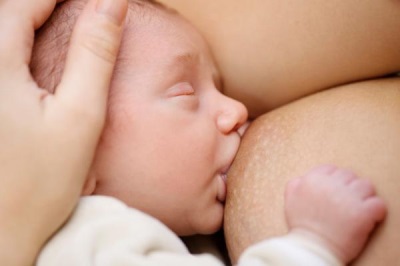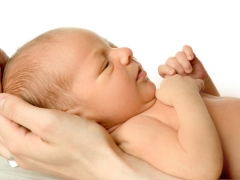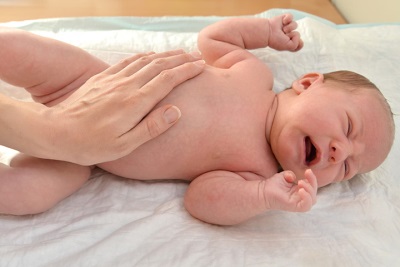Symptoms and treatment of dysbiosis in newborns
When the ratio of microorganisms in the intestine is disrupted in the baby’s body, this condition is called dysbiosis. Can it develop in a newborn, what provokes it, how to identify such a problem and what is important to take to treat it?
The reasons
The intestine of a newborn baby is immature, so the risk of dysbiosis in young children is increased.
To the development of an imbalance of intestinal microflora leads:
- Trauma during childbirth.
- Congenital diseases of the digestive system.
- Prescribing antibiotics and other drugs to the newborn for a long period (longer than 7 days).
- Immunodeficiency.
- Fermentopathy.
- Replacement of breastfeeding artificial in the neonatal period.
Symptoms
In a newborn, dysbiosis can manifest itself with the following symptoms:
- Frequent regurgitation.
- Restless behavior 1-2 hours after eating.
- Disturbed sleep
- Attacks of vomiting.
- Bad weight gain.
- Bloating.
- Diarrhea, represented by a large amount of liquid stools, in which there may be impurities of green color, foam, white lumps. The smell of such a chair sour or putrid.
Risk factors
Violation of the composition of the microflora in the intestines of the newborn contribute to such factors:
- Pregnancy complications and problems with the birth process.
- The presence of bacterial vaginosis in women.
- Poor Apgar scores and resuscitation measures.
- Delayed first breastfeeding.
- Long stay in the maternity hospital.
- Physiologically immature intestine.
- Purulent infections.
Disease progression
When a baby is in the womb, there are no microorganisms in its intestines. Being born, the crumb encounters the first microbes, and normally it will be lactobacilli, E. coli and bifidobacteria. They are found in my mother's birth canal and in breast milk. Also, breast milk (in the early days it is colostrum) includes special factors that stimulate the growth of beneficial microflora in the infant intestine. That is why it is so important to attach the crumb to the breast immediately after childbirth and in the first days in the maternity hospital to give the baby colostrum from her mother's breast.

If the first attachment to my mother's breast happened late or did not happen at all, this increases the risk of another baby getting into the intestines of the infant. Normally, microorganisms that can cause a disturbance of the bowels, are in the gastrointestinal tract of children in small quantities. They are called opportunistic bacteria. While there are few of them in the children's intestines, the baby’s digestion is not disturbed. However, under the action of factors provoking dysbacteriosis, the beneficial flora becomes smaller, which makes it possible for conditionally pathogenic microbes to increase their numbers and affect the condition of the infant's digestive system.
It should also be noted that the majority of newborns during the first days after birth develop passing (transient) type of dysbiosis, manifested by impaired stool. If at the same time the aggravating factors do not act on the baby, and the mother continues to breastfeed the baby, by the end of the first week of life the number of bifidobacteria and lactobacilli in the intestine will prevail.

Diagnostics
To identify dysbacteriosis, the doctor first examines the baby, palpates his intestines and sends the baby to the feces. First, the baby is prescribed to pass a coprogram of fecesand then others feces for dysbacteriosis, among which is the definition of bacteria in feces.
Treatment
Breastfeeding is considered one of the most important moments in the treatment of intestinal flora dysbiosis in a newborn. Babies with dysbacteriosis need particularly strong milk.
If it is impossible to breastfeed, the baby should be given an adapted mixture containing protective factors - bacteria, prebiotics.
To correct the microflora of the baby, bacteriophages can be prescribed and probiotics for children. Also, the infant is prescribed symptomatic therapy.
Consequences of the disease
One of the most dangerous consequences of dysbacteriosis is hypovitaminosis in an infant, as well as impaired absorption of minerals and reduced immunity in the baby. This can significantly affect the health of the newborn.
Prevention of dysbiosis you need to start during pregnancy, read about this in our other article.








